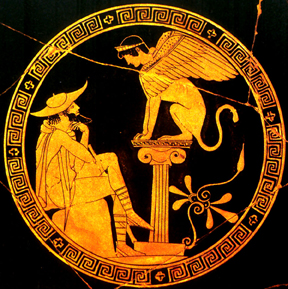Theatre: Why Do Spoilers Suck? Because Art Is Always New
By Wendy Caster
ART TIMES Summer 16
 Oedipus and the Sphinx |
I get it that EW likes splashy covers; I get it that TV shows like free publicity. But couldn’t EW have announced, “Big, juicy spoilers inside,” instead? Yes, they could have. But, no, they didn’t care to, showing disrespect to the viewers, writers, and performers of this show.
What is the expiration date of spoilers? Ideally, never—not even for the most ancient of plays. After all, it takes close to zero effort to add a warning to an article or review or interview: “By the way, this piece discusses the entire plot of Oedipus Rex.” Or “Warning: this recap includes spoilers from Hamlet.” Or, my personal favorite, “Here be spoilers.”
Does this sound laughable? After all, Oedipus Rex was written around 429 BC. Hamlet was originally published in 1603. Surely every one knows how they end? Surely their plots aren’t that important?
 Edwin Booth as Hamlet |
No. And no.
It doesn’t matter when a play was written. What matters is whether it is a living piece of art. Both Oedipus Rex and Hamlet are as alive now as they were hundreds of years ago. Both can be brand new to someone who hasn’t seen them yet.
When reviewers, journalists, and interviewers don’t label spoilers, they steal other people’s right to see something for the first time. (I understand that some people don’t care if they know the entire plot in advance. That’s their business. It doesn’t mean that people who like to be surprised should be denied that opportunity.)
I remember my first exposure to Hamlet (here be spoilers). I was reading it on a local bus on the way home from high school, and I was laughing my head off as all the dramatis personae murdered each other. What a bunch of fools! (end of spoilers)
Yes, that’s not the official accepted interpretation of the great tragedy of Hamlet, but it was my genuine, honest response—one that I would have been denied if I had been told the entire story in advance.
 Poster from the Young Vic Production of “A Streetcar Named Desire” |
More recently I had the unique and wonderful experience of seeing A Streetcar Named Desire with two people unfamiliar with the play. One had grown up in Germany; the other is 22 years old. What fabulous opinions they brought to our post-show discussion, opinions that were totally their own and in some cases eye-opening. (yup, spoilers here) When I asked the 22-year-old what she thought of the rape scene, and did she even think it was rape in the first place, she gave me a thoughtful and smart answer rooted in the 21st-century language of consent. How wonderful that this masterpiece can still be understood, felt, and relevant 70 years after it was created, in a world where sexual mores have been rewritten and rewritten and rewritten again. Streetcar lives! (end of spoilers)
A show doesn’t need to have a surprise ending or a dramatic twist to deserve to be seen on its own terms. Writers work incredibly hard to calibrate their plays, meting out information, carefully developing characters, and bringing emotions to a boil (or cooling them down) in exactly the best way to lead the audience through a particular experience. I don’t understand why other people disrespect that calibration.
I may be extreme in my anti-spoiler stance. I don’t read the backs or dust covers of books. I often skip trailers of movies I’m excited about. If I am invited to review a new show, I frequently decide to know as little about it as possible. I trust the artists who make theatre, novels, movies, TV. I like nothing better than to put myself in their hands and say, “Take me where you want.” They are the experts, and it is a delight to let them tell the story the way they think it should be told.
And all it takes is a spoiler warning…
(Wendy Caster is an award-winning writer living in New York City. Her reviews appear regularly on the blog Show Showdown. Her short plays You Look Just Like Him and The Morning After were performed as part of Estrogenius festivals. Her published works include short stories, essays, and one book. )
